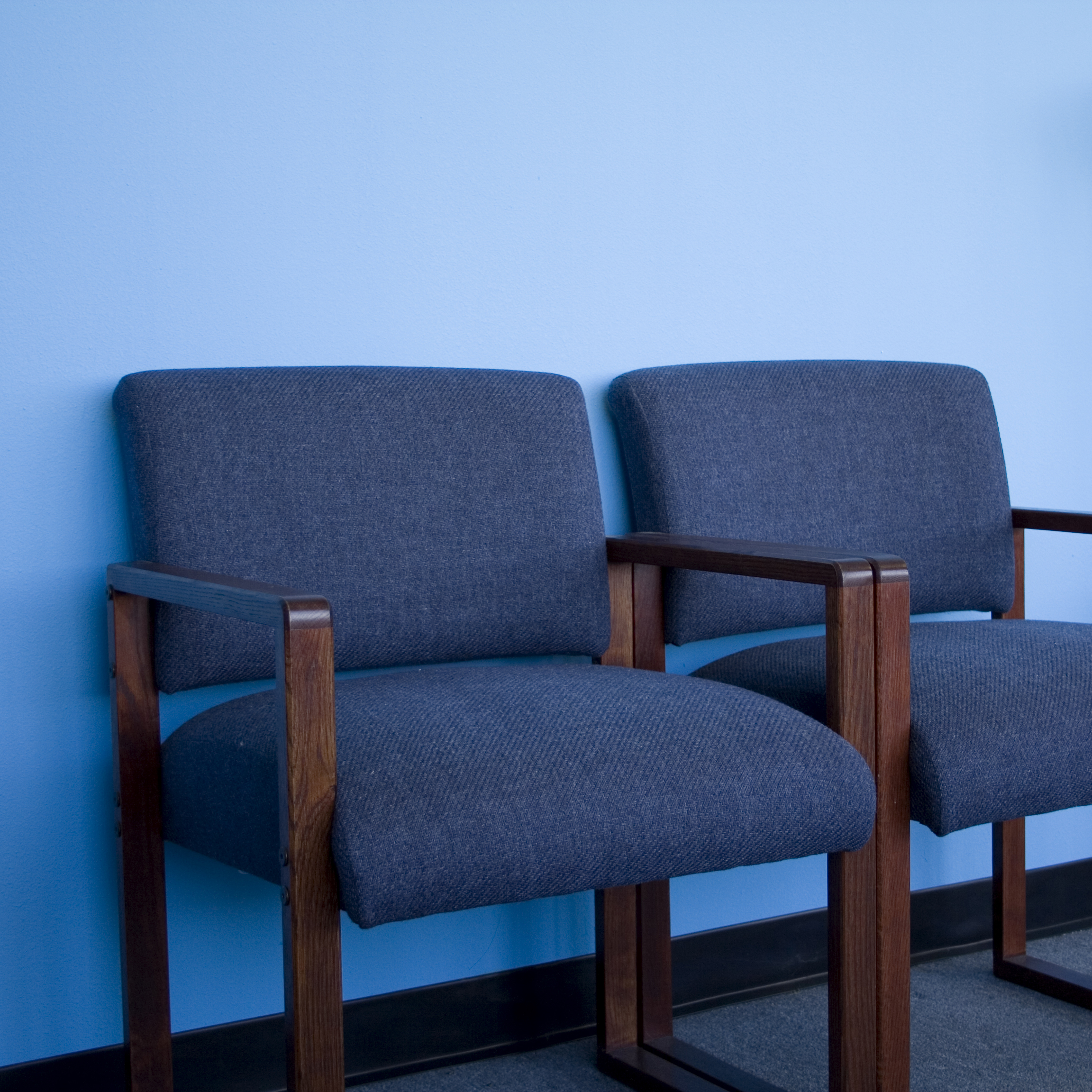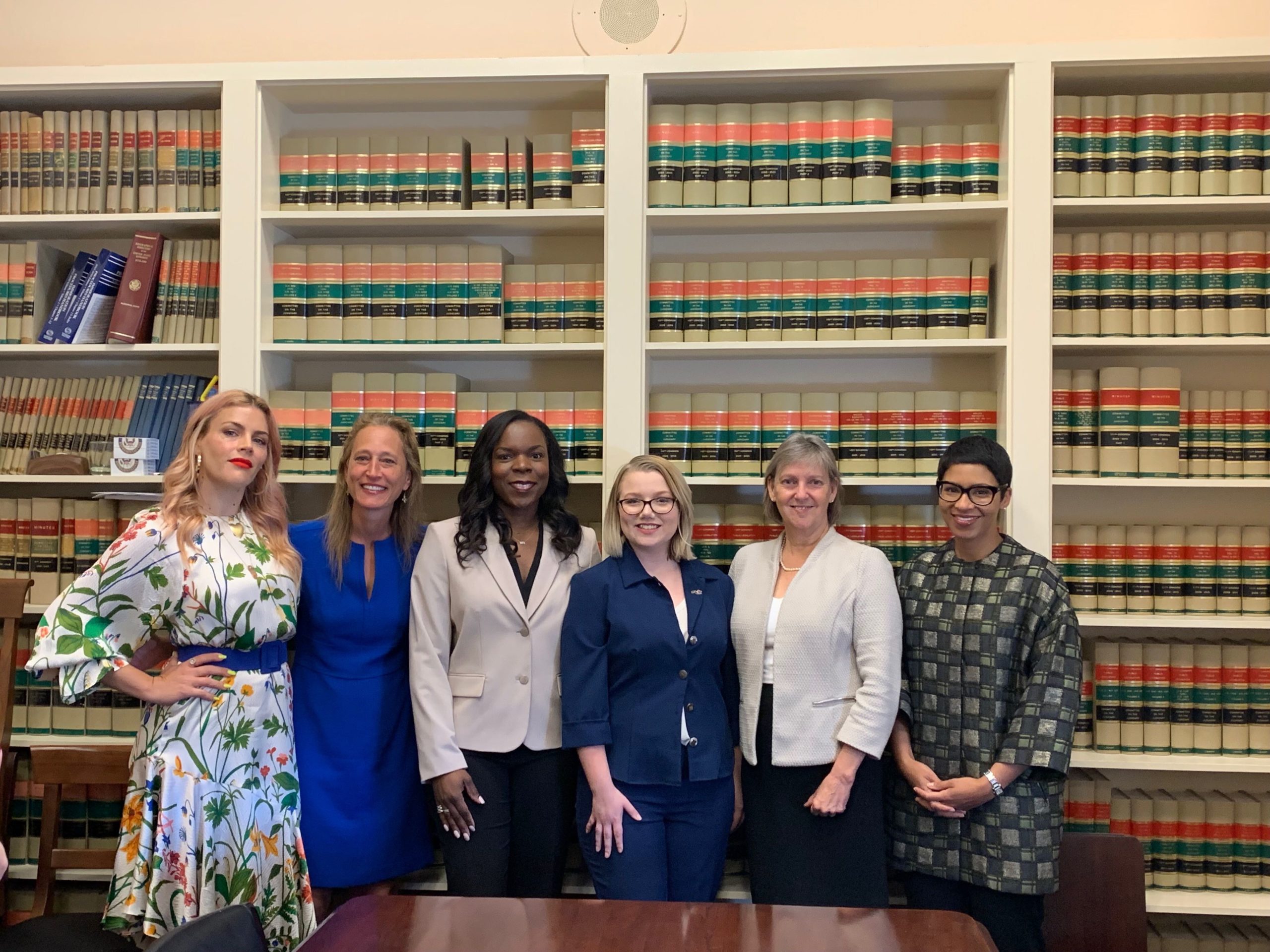Abortion rights, women of color, and LGBTQIA+ people are under attack. Pledge to join us in fighting for gender justice.
My Top 3: Takeaways From the Tennessee Summer Study to Ban Abortion

Last week I testified at the “summer study” of Tennessee House Bill 1236, which, as amended, would be a near total ban on abortion in Tennessee. The summer study isn’t often used to seriously consider legislation; rather, bills are typically sent to summer study to die when they don’t pass during a regular legislative session. But unfortunately for those of us that value bodily autonomy and access to health care, not so for Tennessee’s latest attempt to ban abortion.
For much of Monday and Tuesday, I sat in a crowded room of the Cordell Hull Building in Nashville, listening to a small group of (mostly white, male) state legislators consider the fate of legal abortion in Tennessee. To be clear, this summer study was a complete farce, and not at all a balanced and serious attempt to study all sides of a bill that would almost totally ban legal abortion in Tennessee. Instead it was an opportunity for anti-abortion legislators to spend two days discussing the different ways that they could best achieve a ban on abortion. Here are my takeaways from those two days in Nashville:
Takeaway #1: The speakers were totally unrepresentative of the folks that would be most impacted by an abortion ban. Those who tried to speak about the harm that bills would cause were silenced.
Banning abortion would have serious repercussions for pregnant people in Tennessee. All of the harms imposed by abortion restrictions – and that would be amplified by this bill – fall hardest on those who already face multiple barriers to care, such as women struggling to make ends meet, women of color, rural women, LGBTQ folks, and women who already have children. So you would think the committee would want to hear from those people, right??
Not so much.
The make-up of the witness list wasn’t for lack of trying on the part of reproductive rights advocates. Several folks who have had abortions requested to be on the witness list, but were denied by the Committee Chair and author of the bill’s amendment (that would ban abortion at conception). Also not permitted to speak was a researcher who wanted to present research on “the effects of abortion restrictions on people who can become pregnant and their families.” Seems pertinent, doesn’t it?

So who did the Committee Chair allow to speak? These guys.
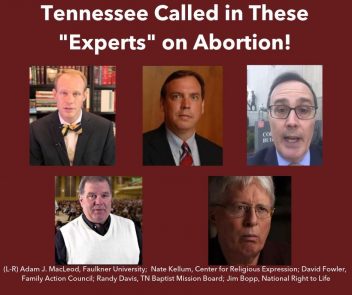
All speakers during the first day were anti-abortion, white, cisgender men. The Committee Chair rationalized that “both sides” were heard because speakers were both for and against the bill – not because they opposed restrictions on access to health care – but rather, because they oppose the particular way the legislature should ban abortion in Tennessee (more on that below). I was the first person to testify, halfway through the second day, that had the capacity to become pregnant.
So many folks were denied the opportunity to speak that reproductive rights advocates held a “People’s Hearing on Abortion” immediately following the first day of the summer study. Advocates planned to use this time to hear from the people who had been silenced. Unfortunately, we were kicked out of that room shortly after we gathered there.
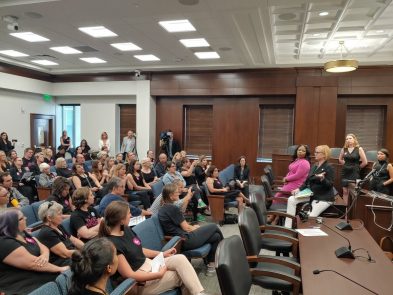
But wait, there’s more…

In a state with a maternal mortality crisis that unduly impacts Black women, the Committee permitted exactly one Black woman to speak: Cherisse Scott, Founder and CEO of SisterReach, a reproductive justice organization based in Memphis. Surely they gave her the respect that she deserved, especially given that they allowed anti-abortion, white cisgender men to literally talk for hours, many, many minutes over their time limit?

The majority of the Committee members refused to listen to Cherisse, by cutting her mic, calling a recess, and walking out during her testimony. My colleagues at SisterReach and NWLC said it best:
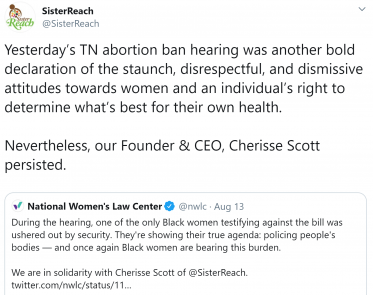
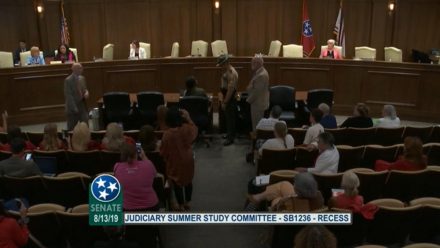
Cherisse spoke truth to power. Here’s a sampling of her testimony:
I am not here to testify about abortion access in a vacuum, because doing so dishonors the lived experiences of vulnerable people who can give birth in our state, the social and economic disparities which inform their daily choices of all kinds including their reproductive health choices and most importantly, the outright and intentional abandonment by the Tennessee state legislature of these vulnerable people who happen to comprise all races, classes, religions, socio-economic statuses and those who do not profess any faith. I am here to testify on behalf of all of them – the thousands of vulnerable people in Tennessee who would be hurt by Senate Bill 1236 – as it, for many, is the final straw in a political pattern of vile, racist, un-American and un-Christian legislation that has come from the majority of this body’s leadership.
Read more about the speakers during both days here.
Takeaway #2: Anti-abortion groups are at odds.
I went to the summer study prepared to explain why Senate Bill 1236, as amended, is blatantly unconstitutional, just like the laws that passed in Alabama, Georgia, Kentucky, Louisiana, Mississippi, Ohio, and Missouri. But as the first day went on, and speakers started into the second day, it was obvious to me that this wasn’t a debate about whether it was advisable to further restrict abortion. It was an open strategy session on how to ban abortion; one that had anti-abortion groups split on the best tactic to achieve their goal.
The bill as amended would ban abortion by redefining “viability” to say that a pregnancy is viable at conception. You don’t need to be a medical provider to know that this definition is totally inaccurate. It’s also obviously unconstitutional – so much so that most anti-abortion speakers agreed that it would violate the clear constitutional standard set under Roe v. Wade. As a way to get around precedent, much of the discussion centered around a Ninth Amendment argument as a new vehicle to challenge Roe.
Some speakers felt strongly that an all-out ban on abortion, like Senate Bill 1236 as amended, was the way to ban abortion in Tennessee, and get to the Supreme Court to ban abortion across the U.S. Others disagreed, and thought this strategy was ill-advised:
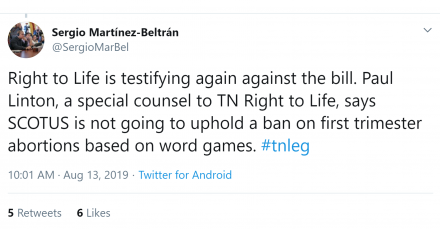
One speaker even said this approach made them look “foolish.”

The bill as amended is blatantly unconstitutional. And the Ninth Amendment argument is totally bonkers. But regardless, it was interesting to see a long-time divide over anti-abortion strategy play out in-person, particularly since anti-abortion advocates feel like this is their best opportunity to overturn or gut Roe. Which takes me to my last takeaway…
Takeaway #3: Anti-abortion advocates and lawmakers think this is their moment to ban abortion.
While anti-abortion groups seem to be at odds as to their strategy to ban abortion, make no mistake:
They. Are. Emboldened.
I wasn’t totally shocked by their audacity. While an overwhelming majority support protecting the right to abortion, abortion rights are under unprecedented attack throughout the U.S. In 2019 alone, state legislators introduced over 400 new abortion restrictions, and enacted 58 restrictions, including several near total – and blatantly unconstitutional – bans on abortion, like Senate Bill 1236 as amended. Before this year, extreme bans on abortion were typically seen – even by many anti-abortion advocates – as too radical. But with Justice Kavanaugh on the Supreme Court, the nomination and appointment of numerous lower court judges opposed to reproductive rights, and the anti-abortion rhetoric of the Trump administration, anti-abortion advocates have felt more emboldened than ever to pursue unconstitutional abortion bans. This year, state lawmakers in seven states – Alabama, Georgia, Kentucky, Louisiana, Mississippi, Ohio, and Missouri – passed laws that would prohibit nearly all abortions.
What was surprising to me was the degree of boldness and openness to which they spoke about their strategy and end game. They weren’t afraid to discuss tactics, even in a room that included many reproductive rights advocates – signaling to me their sense of control and disregard of differing opinions. They didn’t hide that their goal was to overturn Roe; many speakers and lawmakers mentioned the importance of the Trump administration, particularly for the courts, and how crucial it was for them to remain in power. Not so appropriate for a public forum supposedly intended to be an exercise in democracy.
BONUS Highlight: Tennessee reproductive rights and justice advocates and lawmakers are amazing.
I have a lot of bad things to say about the Tennessee study summer. But so much of the hearing gives me hope. Reproductive rights and justice advocates showed up in huge numbers to make sure that anti-abortion politicians wouldn’t have the only say those days. And the two lone lawmakers that support reproductive rights on the Committee, Senator Robinson and Senator Kyle, made sure that they asked questions that highlighted that access to abortion is a key part of liberty, equality, and economic security. And despite the fact that abortion providers are constantly under attack and threatened with violence and harassment, Dr. Nikki Zeit of Planned Parenthood of Tennessee and Dr. Susan Dodd of Knoxville Reproductive Health Center bravely spoke about how an abortion ban would impact their patients.
Thank you to the reproductive rights and justice champions. I know they won’t stop fighting for access to reproductive health care, and neither will we.



